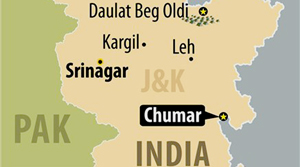Leh/New Delhi: The standoff in Chumar region in Ladakh worsened today after a second intrusion by Chinese army personnel in two days was reported at another point after they had withdrawn from the same area.
Around 50 personnel of People's Liberation Army(PLA) arrived in nine vehicles at Point 30R and they were in addition to the 35-odd pesonnel who were already camping at a hillock in the Chumar area itself, official sources said. Chumar is located 300 km Northeast of Ladakh.
The Chinese soldiers immediately alighted from the vehicles and positioned themselves barely 100 metres away from the Indian Army, which had decided not to withdraw completely from the region even after the Chinese PLA had returned on their own to their side on Thursday night, the sources said.
The 30-R post in Chumar has been frequented by PLA often as Indian Army has kept an observation post which dominates the Line of Actual Control(LAC) and gives advantage to India in keeping a vigil on the Chinese activity deep across the border.
The 35-odd PLA men, who had returned yesterday morning at a different point in Chumar after going back the previous night, continued their stay for the second consecutive day today. The Chinese helicopters were air dropping food packets for its soldiers but had not violated the air space till now, the sources said.
The Army, which had started scaling down operations from the area following the Chinese withdrawal Thursday night, put a halt and again started pitching their tents bracing themselves for a possible stand-off, the sources said.
The tension in this area erupted on Sunday when some of the Chinese workers, who were constructing road on their side, started entering into the Indian side and also claimed that they had orders to build road upto Tible, five km deep into the Indian territory.
The Indian army asked the Chinese workers to leave as otherwise they would face prosecution under Indian laws for entering the country illegally.





Comments
Add new comment